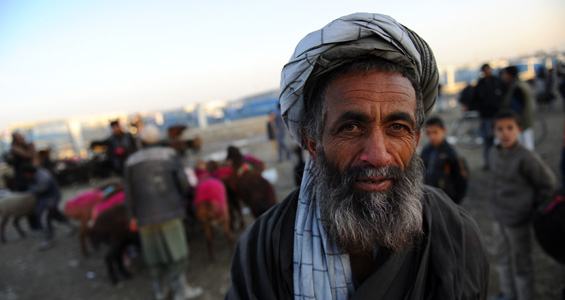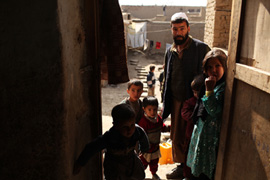To win over Afghans, US must listen
Hekmat Karzai and US Congressman Michael Honda on the battle to win Afghan hearts and minds.

 |
| The US calls for Taliban to disarm and reintegrate [GALLO/GETTY] |
Recent announcements on the war in Afghanistan – from US defence secretary Robert Gates’ call for Taliban disarmament and reintegration, to the US state department’s pledge to increase political, diplomatic and economic engagement, to the recent London conference of international leaders – bode well for a country riddled with violence and poverty.
These are signs that the US and its allies are recognising that the past approach is insufficient in stabilising Afghanistan.
The precedent of pursuing solely military solutions in a country where insecurity runs rampant across political, economic and social spectrums is being rethought and revamped. This is a good thing.
What must also remain front and centre in all decision-making, however, is the constant query for what Afghans want and how to move operations quickly towards Afghan ownership. Most policies fall far short of these two goals.
A failure to win the hearts and minds of Afghans is a failure to win the security the US is seeking at home and abroad. On three critical fronts – security, governance and development – these shortcomings are evident.
Security shortcomings
 |
| Afghans are convinced that the conflict can not be solved through military means [AFP] |
Security, arguably the Afghan and foreign governments’ primary objective, is seriously struggling, but not for the reasons that one is led to believe.
Afghan army and police remain ill-equipped not because Afghans are lackadaisical about their country’s security, as some media have reported.
In fact, Afghans are quite entrepreneurial and industrious.
A primary reason why the security sector is struggling is because the attrition rate is dangerously high due to poor wages, soaring casualty rates, insufficient training, and the fact that the soldiers and police are deployed away from their homes to other provinces where they are viewed as outsiders.
The low recruitment rates for Pashtuns in the south and southeast hardly helps either.
Additionally, some 2,000 US trainer positions for the Afghan army and police have remained unfilled for the second year running.
The persistence of these obstacles, along with the inefficiency of military spending, where the cost of one American soldier, at $1mn annually, could easily salary at least 25 Afghan soldiers, makes it difficult to help Afghans stand up.
Afghans remain convinced that the conflict cannot be solved through military means, which is why we are losing the good will of the Afghan people with continued night raids, dog attacks and detentions.
Transitioning security responsibilities to Afghans sooner than later is critical, but without a political solution that is inclusive and Afghan-led, involving the insurgency’s top leadership, stability will remain elusive.
Hollow calls
Governance is equally malnourished, but again, not for the reasons raised on American shores.
Washington is quick to call out corruption in President Karzai’s political counsel but here lies the rub: Unless Washington is willing to hold its own Afghan and international allies accountable, many of which are guilty of corruption and warlordism, the calls ring hollow.
In Afghan eyes, the US retains little legitimacy in promoting good governance unless it is willing to bring to justice the warlords that continue to provide security and access to American command on the ground.
To get a sense of how bad it is: Afghans cite the International Criminal Court and The Hague as the necessary arbiter for atrocities.
Afghans want better delivery of services, professional and competent appointments, and minimal bureaucracy within the government, all of which reduces corruption.
But castigating Karzai helps no one and only weakens the president’s ability to clean up corruption, embolden the justice system, put in place democratic processes at all levels of government, and enter into reconciliation with a stronger hand.
Development agenda
 |
| The US needs to build Afghan acceptance to rebuild the country [GALLO/GETTY] |
Lastly, the development agenda needs rethinking as Afghans see a foreign disinterest in the building of their country’s capacity.
When $14,000 per day is spent to provide security for a private contractor to survey a project, when Provincial Reconstruction Teams import overpriced water and food from abroad when legitimate options exist locally, and when an initially funded $3m project lands on the ground with only $300,000 to show for it due to the multiple sub-contracting and skimming, Afghans are understandably unimpressed.
Afghan alternatives – like the government’s Community Development Councils, which fund locally elected councils to design and manage their own projects – should be the focus instead.
In order to build Afghan ownership and capacity, contractors may need to forego the actual building and instead redistribute the funds into Afghan institutions and initiatives like the CDCs as foreign affiliation with the CDCs will put council members at immediate risk.
The key to the main challenges facing the country is to build Afghan acceptance and ownership. When 80 per cent of all foreign aid dollars circumvents the Afghan government entirely, and when the same amount leaves the country in contractor hands not Afghan ones, locals question the motive of the US.
If we want to win the Afghans, then we must listen to what they want.
Hekmat Karzai is the director of the Center for Conflict and Peace Studies based in Kabul, Afghanistan. US Congressman Michael Honda (D-CA) is the Chair of the Congressional Progressive Caucus’s Afghanistan Taskforce.
The views expressed in this article are the author’s own and do not necessarily reflect Al Jazeera’s editorial policy.